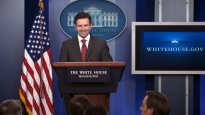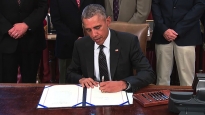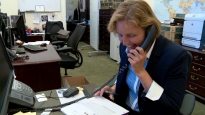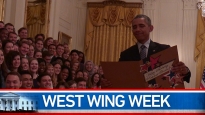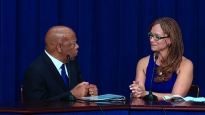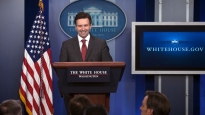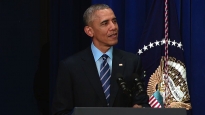President Obama Speaks on American Energy
May 09, 2014 | 15:20 | Public Domain
President Obama announces new steps to help generate more clean energy, waste less energy overall, and leave our kids and our grandkids with a cleaner, safer planet in the process.
Remarks by the President on American Energy
Walmart
Mountain View, California
9:48 A.M. PDT
THE PRESIDENT: Hello, Mountain View! (Applause.) It’s good to be in California. Everybody, have a seat. Have a seat. This is actually my third day on the West Coast. On Wednesday, we went to L.A., then we went to San Diego, we’re here in the Bay Area. But I have to get back because Sunday is what?
AUDIENCE: Mother’s Day!
THE PRESIDENT: It is Mother’s Day. That is a public service announcement -- do not forget. (Laughter.) It’s Mother’s Day.
I told Michelle one time, I said, how come people put so much emphasis on Mother’s Day, and Father’s day not so much? (Laughter.) She said every day other than Mother’s Day is Father’s Day. (Laughter and applause.) Which I thought kind of quieted me down.
I want to thank your mayor, Chris Clark, for hosting us. (Applause.) I want to thank the folks at Walmart. And I know this looks like a typical Walmart, but it is different -- and that’s why I’m here. A few years ago, you decided to put solar panels on the roof of the store. You replaced some traditional light bulbs with LEDs. You made refrigerator cases more efficient. And you even put in a charging station for electric vehicles. And all told, those upgrades created dozens of construction jobs and helped this store save money on its energy bills. And that’s why I’m here today -- because more and more companies like Walmart are realizing that wasting less energy isn’t just good for the planet, it’s good for business. It’s good for the bottom line.
AUDIENCE MEMBER: (Inaudible.)
THE PRESIDENT: Yes, see, he agrees. (Applause.) And it means jobs.
Changing the way we use energy is just one of the ways Americans have been working so hard to move this country forward. In the wake of the worst financial and economic crisis in generations, our businesses now have created over 9.2 million new jobs. A housing market that was reeling is rebounding. An auto industry that was flat-lining is now booming. You’ve got a manufacturing sector that had lost a third of its jobs during the ‘90s and now is adding jobs for the first time. More than 8 million Americans have now signed up for health care coverage through the Affordable Care Act. (Applause.) Troops that were fighting two wars are coming home. And rather than create jobs in other countries, more companies are actually choosing to create jobs and invest right here in the United States of America.
But we’ve got a long way to go before we get to where we need to be -- which is an economy where everybody who works hard, everybody who takes responsibility has a chance to get ahead, and that we have a chance to build an economy that works not just for a few at the top, but for everybody. That’s our goal -- the idea that no matter who you are, no matter what you look like, no matter where you come from, what your last name is, if you work hard, if you take responsibility, you can make it here in America.
And that starts with helping businesses create more good jobs. One of the biggest factors in bringing jobs back to America has been our commitment to American energy over the last five years. When I took office, we set out to break our dependence on foreign oil. Today, America is closer to energy independence than we have been in decades. We generate more renewable energy than ever, with tens of thousands of good American jobs to show for it. We produce more natural gas than anyone -- and nearly everybody’s energy bill is lower because of it. So are our carbon emissions that cause climate change.
We set new fuel standards for our cars and trucks so that they’ll go twice as far on a gallon of gas by the middle of the next decade. That saves the typical family about $8,000 at the pump. And for the first time in nearly 20 years, America produces more oil here at home than we buy from other countries.
So we’re producing more traditional energy, but we’re also becoming a leader in the energy sources of the future. We’re becoming a global leader in solar, thanks in part to the investments we’ve made in the Recovery Act. Over the past few years, the cost of solar panels have fallen by 60 percent; solar installations have increased by 500 percent. Every four minutes, another American home or business goes solar, and every panel is pounded into place by a worker whose job cannot be overseas.
So today, no matter where you live or where you do business, solar is getting cheaper and is getting easier to use than before. And with more businesses and rural cooperatives and homes choosing solar, prices keep coming down, manufacturers keep getting more innovative, and more jobs are created. Last year, jobs in the solar industry increased by 20 percent.
But we’ve got more work to do. And I want to work with Congress to do it. Unfortunately, Congress has not always been as visionary on these issues as we would like. It can be a little frustrating. But in this Year of Action, wherever I can go ahead and create my own opportunities for new jobs, I'm going to take it.
And so far, I’ve taken more than 20 executive actions -- from launching new hubs to attracting more high-tech manufacturing jobs to America, to reforming our job training programs to make sure more Americans are getting the skills they need to get the jobs that exist right now.
And so today, here at Walmart, I want to announce a few more steps that we’re taking that are going to be good for job growth and good for our economy, and that we don't have to wait for Congress to do. They are going to be steps that generate more clean energy, waste less energy overall, and leave our kids and our grandkids with a cleaner, safer planet in the process.
So let me list these out. Number one, we know that making buildings more energy efficient is one of the easiest, cheapest ways to create jobs, save money, and cut down on harmful pollution that causes climate change. It could save our businesses tens of billions of dollars a year on their energy bills -- and they can then use that money to grow and hire more folks. It would put construction workers back to work installing new systems and technologies. So this is what you call a win-win-win.
So that’s why, three years ago, I announced what we called the Better Buildings Initiative. It's an ambitious plan to improve the energy efficiency of America’s commercial buildings by 20 percent by the year 2020. And already we've got 190 businesses and organizations that have signed on. On average, they’re on track to meet their goal -- cutting energy use by 2.5 percent every single year. Together, they’ve already saved $300 million in energy costs. So we know it works.
And that’s why, over the past few months, I’ve been picking up the phone and reaching out to more leaders to get them on board. And today, they’re stepping up -- from cities, school districts, businesses, universities, you're seeing folks move on energy efficiency. GM is pledging to improve energy efficiency in 31 plants. The University of Virginia is doing the same thing in its buildings. Cities like Little Rock, Kansas City and Detroit are replacing regular street lights with more efficient LEDs.
And at Walmart, you’ve committed to reducing energy consumption across 850 million square feet of space. That's a lot. That's enough to cover more than half of the city of San Francisco. Taken together, this is going to make a difference, and it's the right thing to do for the planet, but it’s also the right thing to do for the bottom line. Because when you save that money you can pass that money back to consumers in the form of lower prices, or you can use it to create more jobs.
So folks in the private sector are doing their part to create jobs and reduce pollution and cut waste. I’m making sure the federal government does its part. Two years ago, I ordered $2 billion in energy upgrades to federal buildings. Today, I’m ordering an additional $2 billion in upgrades over the next three years. And these upgrades will create tens of thousands of construction jobs and save taxpayers billions of dollars.
The Department of Energy is putting a new efficiency standard -- set of efficiency standards in place that could save businesses billions of dollars in energy costs and cut carbon pollution -- and it's the equivalent of taking about 80 million cars off the road. And I want to thank Ernie Moniz, Secretary of Energy, and Secretary Donovan -- Shaun Donovan of HUD -- who are here today because they’ve shown extraordinary leadership on these issues. That's worth applauding. (Applause.)
So that’s the first announcement. Cities, schools, businesses, the federal government -- we’re all going to pledge to waste less energy and we’ve got concrete strategies that we know work.
The second announcement is about more Americans coming together to use more clean energy. Last month, I called up leaders from a whole range of industries and made the economic case for why solar is a good idea. And they listened. And today, more than 300 organizations -- from homebuilders, to affordable housing owners, to companies like Home Depot and Apple -- announced that they are going to expand the use of solar energy, thereby creating more jobs and cutting carbon pollution.
We’ve got public banks like Connecticut’s Green Bank and private banks like Goldman Sachs ready to invest billions of dollars in renewable energy. The Treasury Department and the IRS are making it easier for renewable energy companies to operate and attract investment. And we’re going to support training programs at community colleges across the country that will help 50,000 workers earn the skills that solar companies are looking for right now.
Walmart has already got the most installed on-site solar capacity of any company in America. And now you’ve announced plans to double that capacity. And it’s all part of your goal to buy or produce 7 billion kilowatt hours of renewable energy by 2020 -- something that could save Walmart $1 billion a year in energy costs.
So we know that generating more clean energy, using less dirty energy, and wasting less energy overall can be good for business and consumers. And it’s also good for the world that we leave for our children.
So together, the commitments we’re announcing today prove that there are cost-effective ways to tackle climate change and create jobs at the same time. So often, when we hear about how we’re going to deal with this really serious issue, people say we can’t afford to do it; it won’t be good for the economy. It will be good for the economy long term -- and if we don’t, that will be bad for the economy. Rising sea levels, drought, more wildfires, more severe storms -- those are bad for the economy. So we can’t afford to wait. And there’s no reason why we can’t even go further than we are so far by working with states and utilities, and other organizations to change the way we power our economy. Climate change is real and we have to act now.
Earlier this week, I issued -- or we issued a report that was years in the making called the National Climate Assessment. Hundreds of scientists, experts and businesses, not-for-profits, local communities all contributed over the course of four years. What they found was unequivocally that climate change is not some far-off problem in the future. It’s happening now. It’s causing hardship now. It’s affecting every sector of our economy and our society -- more severe floods, more violent wildfires. It’s already costing cities and states and families and businesses money.
Here in California, you’ve seen these effects firsthand. You know what’s happening. And increasingly, more and more Americans do -- including, by the way, many Republicans outside of Washington.
So unfortunately, inside of Washington we’ve still got some climate deniers who shout loud, but they’re wasting everybody’s time on a settled debate. Climate change is a fact.
And while we know the shift to clean energy won’t happen overnight, we’ve got to make some tough choices along the way. And we know that if we do, it’s going to save us ultimately money and create jobs over the long term. That's what Walmart understands, and Walmart is pretty good at counting its pennies.
So that’s why this fight is so important. That’s why the sooner we work together to adapt the economy to this reality of climate change, the more likely it is that we do right by our kids and leave a more stable world. And ultimately that's what motivates a whole lot of us.
As Americans, we don’t look backwards. We look forward. We don’t fear the future, we seize it. We shape it. And when it comes to energy, we have a chance to shape that sector that is probably going to have more to do with how well our economy succeeds than just about any other. We are blessed when it comes to energy, but we’re much more blessed when it comes to the innovation and the dynamism and the creativity of our economy.
If we do our part right now to rebuild an economy and transition to a clean energy future, we will create new jobs, we will reduce our dependence on foreign oil, we will leave our children with a better America and a better future.
So thank you very much, everybody. God bless you. (Applause.) Thanks to all the companies who are doing the great work, and the not-for-profits. We appreciate your leadership.
Thank you, guys. Happy Mother’s Day, moms! (Applause.)
END
10:02 A.M. PDT
|
August 7, 2015
|
August 7, 2015
|
August 7, 2015
|
August 7, 2015
|
|
August 6, 2015
|
August 6, 2015
|
August 6, 2015
|
August 6, 2015
|
- &lsaquo previous
- …
- 111
- 112
- 113
- 114
- 115
- 116
- 117
- 118
- 119
- …
- next &rsaquo
